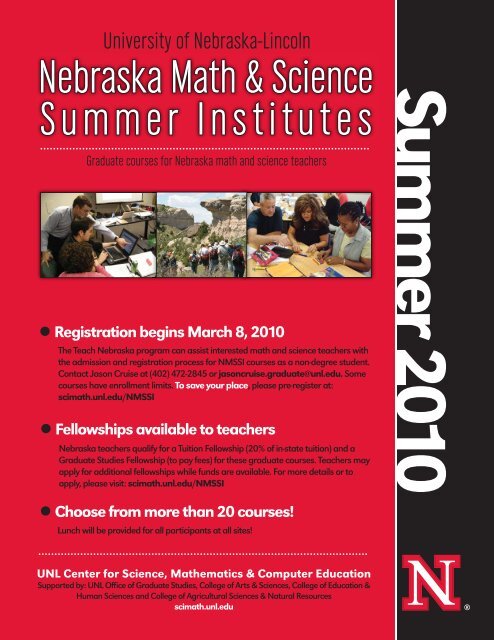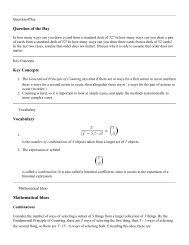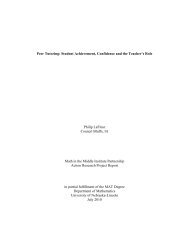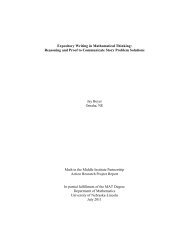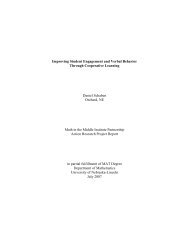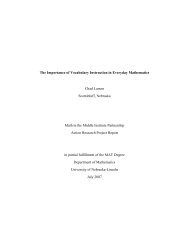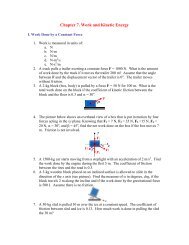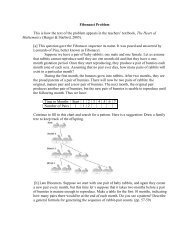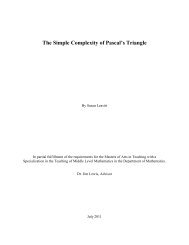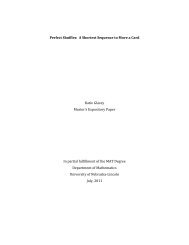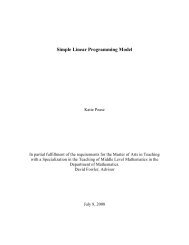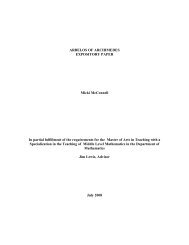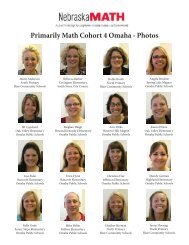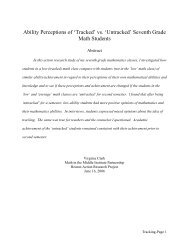Printable Course Catalog - Center for Science, Mathematics ...
Printable Course Catalog - Center for Science, Mathematics ...
Printable Course Catalog - Center for Science, Mathematics ...
- No tags were found...
Create successful ePaper yourself
Turn your PDF publications into a flip-book with our unique Google optimized e-Paper software.
University of Nebraska-LincolnNebraska Math & <strong>Science</strong>Summer m Institutest t sGraduate courses <strong>for</strong> Nebraska math and science teachers• Registration begins March 8, 2010The Teach Nebraska program can assist interested math and science teachers withthe admission and registration process <strong>for</strong> NMSSI courses as a non-degree student.Contact Jason Cruise at (402) 472-2845 or jasoncruise.graduate@unl.edu. Somecourses have enrollment limits. To save your place, please pre-register at:scimath.unl.edu/NMSSI• Fellowships available to teachersNebraska teachers qualify <strong>for</strong> a Tuition Fellowship (20% of in-state tuition) and aGraduate Studies Fellowship (to pay fees) <strong>for</strong> these graduate courses. Teachers mayapply <strong>for</strong> additional fellowships while funds are available. For more details or toapply, please visit: scimath.unl.edu/NMSSI• Choose from more than 20 courses!Lunch will be provided <strong>for</strong> all participants at all sites!Summer 2010UNL <strong>Center</strong> <strong>for</strong> <strong>Science</strong>, <strong>Mathematics</strong> & Computer EducationSupported by: UNL Office of Graduate Studies, College of Arts & <strong>Science</strong>s, College of Education &Human <strong>Science</strong>s and College of Agricultural <strong>Science</strong>s & Natural Resourcesscimath.unl.edu ®
Featured <strong>Course</strong>: GEOS 898Teacherquotes“This is trulythe best courseI have everfftaken. I havelearned morein these threeweeks (aboutgeology, myself,others, life,etc.) than I everhave or couldhave in oneyear.” - Student,class of 2007“Thanks <strong>for</strong>the awesomeadventure.I learned somuch andenjoyed sciencemore than Iusually expect.”- Student, classof 2005GEOS 898 (June 20-30)<strong>for</strong> middle- and highschoolteachers is an11-day, inquiry-basedfield course. Participantswill experiencelearning (and camping)in the great outdoorsacross Nebraska, SouthDakota and Wyoming.The primary aim of thiscourse is to improveeducators’ knowledgeand understandingof geoscience and todemonstrate effectiveteaching methods <strong>for</strong>K-12 learning environments.Participants willdiscover, observe andstudy natural phenomena,focusing on rocks,sediment and Earthhistory. Enrollmentis limited to 12. For avideo describing thiscourse visit: scimath.unl.edu/NMSSI.Nebraska Math & <strong>Science</strong> Summer InstitutesWe are pleased to announce the Nebraska Math & <strong>Science</strong> Summer Institutes(NMSSI) Summer 2010 course offerings. Our goal is to offer Nebraska teachers ofmath and science intellectually rich graduate coursework that will enhance theirability to offer their students challenging courses and curricula. The NMSSI beganas an ef<strong>for</strong>t to continue offering Nebraska teachers the opportunity to take coursesthat were created as part of the NSF-funded master’s program, Math in theMiddle. While our course offerings reflect that origin,we now offer courses <strong>for</strong> math and science teachers atall grade levels.NMSSI courses are designed with teachers’schedules in mind. We offer face-to-face instructionconcentrated into a one- or two-week period followedby an End-of-<strong>Course</strong> Assignment designed to supportlong-term retention of materials studied. Somecourses also have an online component using theFor more detailsand updatedin<strong>for</strong>mationabout NMSSIcourses, visit:scimath.unl.edu/NMSSIBlackboard learning environment. New in Summer 2010 we will be offering threeDistance Education courses <strong>for</strong> science teachers. Our experience is that teachersappreciate our <strong>for</strong>mat because it allows <strong>for</strong> collaboration with colleagues whileprotecting most of the summer <strong>for</strong> other pursuits. In addition, it minimizes housingand subsistence costs and time away from home <strong>for</strong> teachers who must travelto the course location in order to pursue graduate education.To make the NMSSI professional-development opportunities more af<strong>for</strong>dable,UNL has agreed to offer tuition discounts and fellowships that cover the cost of feesto Nebraska teachers who take our summer courses. These fellowships reduce the costto approximately two-thirds of the normal cost <strong>for</strong> tuition and fees. In addition, weare partnering with UNO and Nebraska’s ESUs to offer six courses outside of Lincoln.This brochure provides brief descriptions of the courses that are offeredthrough the Nebraska Math & <strong>Science</strong> Summer Institutes in Summer 2010. Formore details, visit: www.scimath.unl.edu/NMSSI.& = <strong>Course</strong>s may be taken concurrently2010 NMSSI <strong>Course</strong> Calendar* Web = <strong>Course</strong> has an online component*MATHEMATICSSCIENCEDate: Lincoln Offered Outside Lincoln LincolnJune 7-11 CSCE 896MATH 896 & TEAC 892June 14-18 CSCE 896MATH 896 & TEAC 892STAT 892June 20-30MATH 800T (Omaha)MATH 802T (Kearney)MATH 805T (Columbus)MATH 802T (Omaha)MATH 804T (Scottsbluff)CHEM 898TEAC 842EPHYS 870T WebTEAC 842EGEOS 898 (Travel from Lincoln)June 21-25 MATH 896 & TEAC 801 PHYS 870T WebAGRO 896 WebJune 28-July 2 MATH 896 & TEAC 801 MATH 800T (Neligh)MATH 808TMATH 807July 6-9ENTO 810 Web & TEAC 842E WebJuly 12-16 MATH 896 & TEAC 880EJuly 19-23 MATH 896 & TEAC 880ENote that in addition to courses listed in the calendar above, we are also offering courses as part of the NebraskaMATHand Math in the Middle programs. It is not too late to apply <strong>for</strong> some of these programs. For more in<strong>for</strong>mation see thefollowing Web site: scimath.unl.edu/nebraskamath.The University of Nebraska–Lincoln does not discriminate based on gender, age, disability, race, color, religion, marital status, veteran’s status, national or ethnic origin, or sexual orientation.
2010 NMSSI <strong>Course</strong> <strong>Catalog</strong>For additional in<strong>for</strong>mation about these courses, please visit: scimath.unl.edu/NMSSIElementary <strong>Mathematics</strong> Teachers:MATH 800T: Math as a Second Language <strong>for</strong> Elementary Teachers / Grade 3-6 Teachers / June 28-July 2 / NelighDescription: Focuses on the development of “habits of mind of a mathematical thinker.” The approach is to understand arithmetic(number) and (introductory) algebra as a means of communicating mathematical ideas, and will stress a deep understanding of thebasic operations of arithmetic of whole numbers and fractions, as well as the interconnected nature of arithmetic, algebra andgeometry as they relate to grades 3-6 curricula. Call #: 4343MATH 896: Algebraic Thinking <strong>for</strong> the K-4 Classroom / Grade K-4 Teachers / June 21-25 and June 28-July 2 / LincolnDescription: Discussion will revolve around student understanding of Algebraic properties of mathematics as participants examinecase studies, video segments and student work samples. Participants will explore instructional strategies <strong>for</strong> fostering Algebraicthinking. This course may be taken concurrently with TEAC 801: Curriculum Inquiry. Call #: 4339TEAC 801: Curriculum Inquiry / Grade K-4 Teachers / June 21-25 and June 28-July 2 / LincolnDescription: Focuses on building an understanding of mathematics curriculum development, including historical and contemporaryissues that influence curriculum planning and educational change. May be taken concurrently with MATH 896: Algebraic Thinking <strong>for</strong>the K-4 Classroom. Call #: 4436Middle-Level <strong>Mathematics</strong> Teachers:MATH 800T: Math as a Second Language / Grade 5-8 Teachers / June 7-11 / OmahaDescription: Focuses on the development of “habits of mind of a mathematical thinker”. The approach is to understand arithmetic (number)and (introductory) algebra as a means of communicating mathematical ideas, and will stress a deep understanding of the basic operations ofarithmetic, as well as the interconnected nature of arithmetic, algebra and geometry relating to the middle-level curriculum. Call #: 4335MATH 802T: Functions, Algebra & Geometry / Grade 5-8 Teachers / Two Locations: June 7-11 in Kearney, June 14-18 in OmahaDescription: Designed to help gain a deep understanding of the concept of function and the algebra and geometry concepts taught in theK-8 curriculum. Participants will study measurement with an emphasis on length, area and volume. Kearney Call #: 4334, Omaha 4336MATH 804T: Experimentation, Conjecture & Reasoning / Grade 5-8 Teachers / June 14-18 / ScottsbluffDescription: Focuses on problem solving, reasoning and proof, communicating mathematics, and helping teachers develop the habitsof mind of an effective mathematical thinker. It utilizes resources of the American <strong>Mathematics</strong> Competition (AMC) and includestopics such as golden rectangles, Platonic solids, Fibonacci numbers, symmetry and probability. Call #: 4337MATH 805T: Discrete Math / Grade 5-9 Teachers (Secondary Audience: 10-12 Teachers) / June 7-11 / ColumbusDescription: Designed to deepen knowledge of discrete mathematics as it relates to topics covered in middle-grades curricula. <strong>Course</strong> topics(such as graph theory and counting techniques) are introduced through “hands-on” explorations through which various problem-solvingstrategies are emphasized. Call #: 4333MATH 808T: Concepts of Calculus / Grade 5-8 Teachers (Secondary Audience: 9-10 Teachers) / June 28-July 2 / LincolnDescription: Develops a fundamental understanding of the key mathematical ideas of calculus in order to broaden teachers’ mathematicalperspective and gain insight into concepts contained in the middle-level curriculum which are related and foundational to the developmentof calculus. Topics include limits, differentiation, integration, applications and the Fundamental Theorem of Calculus. Call #: 4342STAT 892: Statistics / Grade 5-8 Teachers (Secondary Audience: 9-10 Teachers) / June 14-18 / LincolnDescription: Offers an introduction to probability and statistics. It follows an inquiry/discovery design dedicating much of class timeto activities, discussion and group work. The course emphasizes both topics in probability and statistics that are part of the middleschoolcurriculum and also statistics that are used in education and school-based research. Call #: 4338Continued ...
Secondary Computer <strong>Science</strong> & <strong>Mathematics</strong> Teachers:CSCE 896: Alice: A Gateway to Computer <strong>Science</strong> / Grade 7-12 Teachers / June 7-11 and June 14-18 / LincolnDescription: Designed to introduce secondary-school teachers to the Alice programming environment, a 3D graphical environmentwith drag-and-drop programming (see www.alice.org <strong>for</strong> more in<strong>for</strong>mation) with the goal of helping teachers develop an introductorycourse at their schools or integrating the use of technology in their own teaching. No prior computer science or programmingbackground is required. Call #: 4330MATH 896: Functions <strong>for</strong> High School <strong>Mathematics</strong> Teachers / Grade 9-12 Teachers / June 7-11 and June 14-18 / LincolnDescription: A study of functions in the pre-calculus, high school mathematics curriculum from an advanced viewpoint. Functions willbe investigated by examining their utility in more advanced courses and applications, enabling teachers to better understand the importantaspects and appropriate emphasis of a concept. Content will include polynomial, circular (trig), and exponential functions, and theirconnections to calculus. May be taken concurrently with TEAC 892. Call #: 4331TEAC 892: Integrating <strong>Mathematics</strong> Learning & Teaching / Grade 9-12 Teachers / June 7-11 and June 14-18 / LincolnDescription: This course will focus on the learning and teaching of functions and other key ideas in the pre-calculus curriculum withthe goal of explicitly applying the advanced mathematics learned to the improvement of classroom instruction. The course employs amodified Lesson Study design that repeatedly cycles through (1) the learning of a concept, (2) the development of an exemplary classroomlesson about the concept and (3) the improvement of the lesson through reflection. May be taken concurrently with MATH 896: Functions<strong>for</strong> High School Math Teachers. Call #: 4332MATH 807: Capstone <strong>Course</strong>: <strong>Mathematics</strong> <strong>for</strong> High School Teachers I / Teachers seeking secondary math endorsement /June 28-July 2 / LincolnDescription: This workshop-style course will analyze the connections between college-level calculus and abstract algebra and highschool math. It will emphasize the development of skills necessary to recognize these connections and then use them to help studentsexplore and deepen their understanding of math concepts. Prerequisites: undergraduate calculus and abstract algebra. Call #: 4341MATH 896: Topics in Differential Equations / Grade 9-12 Teachers / July 12-16 and July 19-23 / LincolnDescription: After a brief review of basic concepts and theorems in a standard undergraduate differential equations course, linear and nonlinearpredator-prey systems will be investigated using phase plane (graphical) analysis and linear approximations. Methods <strong>for</strong> approximatingsolutions and trans<strong>for</strong>m techniques also will be investigated. Graphical motivation will be used extensively. Prerequisite: two semesters ofundergraduate calculus. May be taken concurrently with TEAC 880E. Call #: 4344TEAC 880E: Classroom Functions with GeoGebra / Grade 9-12 Teachers / July 12-16 and July 19-23 / LincolnDescription: There are 35 built-in functions in GeoGebra, including familiar functions (such as trig functions), less familiar functions(gamma function), and actions that are not typically thought of as “functions” (addition). This course will develop knowledge of thesefunctions and explore their uses in algebra, geometry and pre-calculus curricula. This course may be taken concurrently with MATH896: Topics in Differential Equations. Call #: 4346<strong>Science</strong> Teachers:CHEM 898: Matter Matters: Chemistry, Society & Popular Culture / Grade 9-12 Teachers / June 7-11 / LincolnDescription: The goal of this course is to generate enthusiasm <strong>for</strong> chemistry among young people. The course will explore manyways to increase the appreciation of chemistry among both science-interested and non-science-interested students. One focus will bechemistry as an intellectual enterprise that is deeply embedded in our society, with references and imagery from popular culture. Afew low-cost, safe and effective laboratory exercises will be introduced. Call #: 4387TEAC 842E: Teaching <strong>Science</strong> through Inquiry / Grade 7-12 Teachers (Secondary: K-12) / June 7-11 and June 14-18 / LincolnDescription: An advanced science methods class <strong>for</strong> practicing science teachers with the purpose of learning how to build a scientificclassroom discourse community by integrating diverse instructional strategies that support learning science through scientific inquiry,the use of oral and written discourse, learning principles and promoting academic language development. Call #: 4146Continued ...
PHYS 870T: Learning & Teaching Stellar Astronomy with Instructional Technology / Grade 9-12 Teachers / June 14-18,June 21-25 (and Web) LincolnDescription: This course will cover many aspects of stars including locations and motions in the night sky, the physics of their energyproduction, their evolution and the parameters astronomers use to describe stars. Instruction will consist of web-based lectures,peer instruction, computer simulations and paper-based tutorials. Assignments will focus on content and classroom applications.This course has an online (Web) component. Call #: 4369GEOS 898: Methods in Geoscience Field Instruction / Grade 6-12 Teachers / June 20-30 / Nebraska, South Dakota, WyomingDescription: An 11-day, inquiry-based field course in which participants will experience learning (and camping) in the great outdoorsacross Nebraska, South Dakota and Wyoming. The primary aim of this course is to improve educators’ knowledge and understandingof geoscience and to demonstrate effective teaching methods <strong>for</strong> 6-12 learning environments. Participants will discover, observe andstudy natural phenomena, focusing on rocks, sediment and Earth history. Enrollment is limited to 12. Call #: 4381AGRO 896: Teaching Plant <strong>Science</strong> / Grade 6-12 Teachers / June 21-25 (and Web) / LincolnDescription: Plants establish the foundation of the world’s carbon cycle and are easily studied in the classroom. They can be grownin simple environments to showcase key biology concepts critical to understanding the basis of growth, inheritance and survival.This course focuses on the teaching and learning of basic biology with an applied plant science context and inquiry with plant growingexperiments. This course has an online (Web) component. Call #: 4371ENTO 810: Insects as Educational Tools <strong>for</strong> the Classroom / Grade K-6 Teachers / July 6-9 (and Web) / LincolnDescription: This course offers a general overview of insects and explores how they can be used in the classroom to enhance scienceeducation. Topics include insect diversity, classification of insects and other organisms, insect structure and function, insect behavior,and science inquiry. This course may be taken concurrently with TEAC 842E: Objectives & Methods of <strong>Science</strong> Teaching: Inquiry &Elementary <strong>Science</strong>. This course has an online (Web) component. Call #: 4385TEAC 842E: Objectives & Methods of <strong>Science</strong> Teaching: Inquiry & Elementary <strong>Science</strong> / Grade K-6 Teachers / July 6-9 (and Web) / LincolnDescription: Examines the underlying purpose <strong>for</strong> inquiry science teaching including an examination of the purpose of education, thenature of science and the nature of the learner. The course will focus on the development of inquiry-centered classroom and also onexamining social factors related to science and how to incorporate these into an inquiry approach. This course may be taken concurrentlywith ENTO 810. This course has an online (Web) component. Call #: 4384<strong>Science</strong> Distance Education Opportunities:For science teachers whose schedules require more flexibility, the following online Distance Education (DE) courses areavailable (please go to the Web site www.scimath.unl.edu/NMSSI <strong>for</strong> dates and details):NRES 822 DE: Laboratory Earth: Earth’s Changing Systems / Grade K-12 TeachersDescription: Designed to teacher’s understanding of change in the Earth’s system and to provide opportunities to connect conceptsfrom different disciplines to the world around them. Topics include reading the record of change in rocks, looking <strong>for</strong> evidence ofchange in the Earth’s geochemical cycles and exploring current issues in environmental change. Call #: 4156, Sect #: 200NRES 898 DE: Laboratory Earth: Earth’s Geochemical Systems / Grade 7-12 TeachersDescription: Focuses on an understanding of the basic principles of chemistry through an in-depth examination of the most criticalorganic and inorganic chemical reactions driving the biogeochemical cycles that connect the Earth system and those implicated in thetransfer of carbon between reservoirs. Call #: 4274, Sect #: 700NRES 898 DE: Laboratory Earth: Earth’s Geophysical Systems / Grade 7-12 TeachersDescription: Develop student mastery of the basic principles of physical science through an examination of fundamental physicalprocesses taking place in the Earth system context. Students will build understanding of the basic principles of physics through thein-depth examination of physical <strong>for</strong>ces operating on micro and macroscopic scales. Call #: 4275, Sect #: 800®<strong>Center</strong> <strong>for</strong> <strong>Science</strong>, <strong>Mathematics</strong> & Computer Education251 Avery Hall, University of Nebraska-Lincoln, Lincoln, NE 68588-0131Phone: (402) 472-8965, Fax: (402) 472-9311, E-mail: nebraskamath@unl.edu


